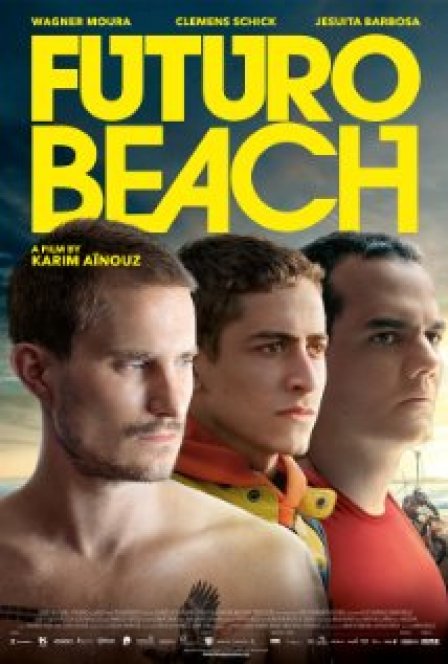Donato (Wagner Moura) is a lifeguard at Futuro Beach, which is both the name of Fortaleza’s most famous beach as well as its accompanying neighborhood. Praia do Futuro earned its name in 1966 after a real estate development project in the northeastern region of the city of Fortaleza. At the actual beach however, the salty air is so violent that no buildings can be constructed nearby as it would invade the concrete, corrode the iron, and rapidly destroy any electronic appliances within the households. This seems to be fitting metaphor for Donato’s future relationship with Konrad (Clemens Schick), which is divided into three acts, each corresponding to a titled chapter and covering different moments in the lives of the two characters. Boy meets boy in the first act when in an unlikely tragic turn of events Donato saves Konrad, a German tourist, from drowning but fails to save his accompanying friend. The two men rapidly fall in love and Donato leaves everything behind in an impulsive decision to relocate in Berlin when finally, in the third and final act, Donato’s brother, Ayrton (Jesuíta Barbosa), pays his estranged brother a dramatic surprise visit.
The chapter divisions and sporadic dialogue breaks the narrative in such a way that the viewer is unable to discern character development or motivation. This would not a problem in itself (I could think of many mood-obsessed films with little to no character development that work tremendously well), but Futuro Beach relies too heavily and too often on lackluster metaphorical meditations on the dichotomous personality of the two central characters. The film opens with Konrad and his friend riding their motorcycles on a sandy beach while Suicide’s “Ghost Rider” plays in the background. Such a heavy-handed opening scene is further reinforced when Donato’s kid brother, Ayrton, actually verbalizes this already awkward symbolism by calling his brother Aquaman and his new friend Ghost Rider.
Fire and water continue to be symbolized through Donato’s Brazilian sunny industrial beaches and Konrad’s gray-tainted Berlin. Donato is unhappy in his new home, and, apparently, the only thing holding him there is either his new lover or his inertia and ennui (since the couple eventually breaks up after a time lapse into the future, I shall stick with the latter hypothesis). “I don’t think I can live in a place without a beach,” he says. The writing and dialogue is sparse, and is Futuro Beach’s weakest quality, as it shines best when the gorgeous cinematography is able to express itself through long takes and symmetric compositions. One particularly striking environment is Konrad’s apartment in Berlin, colorless and with a view to even more white walls. When the couple dances in the living room to some French cabaret music there’s a beautiful calmness and peaceful resignation to love and sexual thrill as Donato’s sole and cerebral escape from the industrial coldness that surrounds him. Unfortunately, these poetic moments are rare, and more often than not the visual composition, pleasing and skillful as it may be, presents itself onscreen completely detached from any visual narrative.
In spite of the lifeless dialogue, performances here are surprisingly good, especially by Wagner Moura who manages to non-verbally express Donato’s detachment, discomfort, and alienation from the urban environment he now finds himself in, finding what little solace he can in late-night clubbing and a new job at a gym’s swimming pool. Futuro Beach clearly takes its inspiration from directors such as Michelangelo Antonioni and Vincent Gallo, meditating on similar themes of miscommunication and alienation, but often forgetting that such subjective themes need to be tangible as well as narratively and visually conveyed to the spectator. By merely presenting its themes through clumsy metaphors and thin dialogue, Karim Aïnouz’s latest feature-length film ends up being a love story without love and a mood-driven film without much mood.

